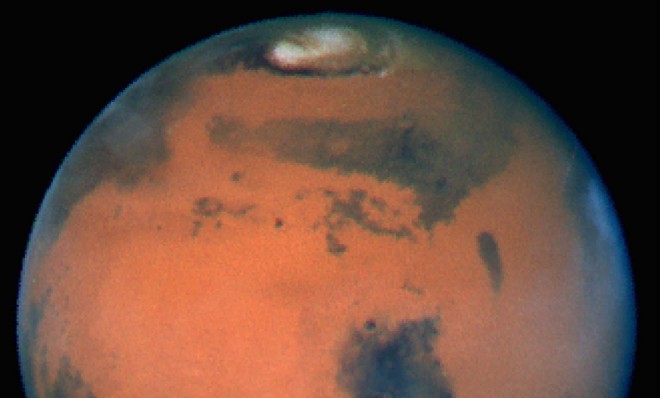Did life on Earth come from Mars?
A non-crackpot scientist is arguing that we are all, essentially, Martians. And he isn't kidding.


A free daily email with the biggest news stories of the day – and the best features from TheWeek.com
You are now subscribed
Your newsletter sign-up was successful
Humans have asked for a long time if there is, or was, life on Mars — David Bowie perhaps most melodically. That's a major reason why we keep sending robotic rovers to the Red Planet.
But a new study adds a twist to the usual narrative, positing that not only was there once life on Mars, but that it also was the beginning of all life on Earth.
On Thursday, at a geochemistry conference in Italy, biochemist Steven Benner of Florida's Westheimer Institute for Science and Technology laid out his theory that all life on Earth started on Mars. He's serious, and while he's not the first to make the claim, he brings some new evidence to the table.
The Week
Escape your echo chamber. Get the facts behind the news, plus analysis from multiple perspectives.

Sign up for The Week's Free Newsletters
From our morning news briefing to a weekly Good News Newsletter, get the best of The Week delivered directly to your inbox.
From our morning news briefing to a weekly Good News Newsletter, get the best of The Week delivered directly to your inbox.
Here's the crux of his theory: Many scientists believe that RNA was the first genetic building block of life to form on Earth, preceding DNA. But the conditions on Earth three billion years ago weren't amenable to RNA's birth. First, the Earth was likely covered with water — or a soup of simple organic molecules — and liquid thwarts the formation of RNA. Just as important, two elements Benner sees as crucial to RNA's creation — boron and oxidized molybdenum — were scarce or nonexistent on Earth at the time.
"This form of molybdenum couldn't have been available on Earth at the time life first began, because three billion years ago, the surface of the Earth had very little oxygen, but Mars did," Benner says is a statement. "The evidence seems to be building that we are actually all Martians; that life started on Mars and came to Earth on a rock."
Yes, hardy microbes — our distant ancestors — hitched a ride to Earth on a meteorite. The idea that living things can survive travel through space is called panspermia, and other scientists agree it's possible. And thanks to meteor fragments from Mars and rovers like NASA's Curiosity, "from what we know of Mars's chemistry three billion years ago, it had all it needed to make a dry cup-a-soup of life," says Richard Webb at New Scientist.
So is Benner right? If we go back far enough in our family trees, are we all Martians? "One thing's for sure: Benner is not a kook," says Alan Boyle at NBC News. "He was one of the first chemists to voice skepticism about the claims for arsenic-based life, which stirred up such a fuss in 2010."
A free daily email with the biggest news stories of the day – and the best features from TheWeek.com
However, that doesn't mean he's right. David Grinspoon, an astrobiologist at the Denver Museum of Nature and Science, admits that Benner has a "plausible story," but tells NBC News that plausible isn't proof. "This isn't really evidence that life came from Mars, but it is evidence that Steven Benner is very clever," he says. Indeed, there are plenty of plausible alternatives that don't involve alien molecules.
On the other hand, "if Benner's theory is right, it offers a mechanism for life — or at least its precursors — to evolve without water," says New Scientist's Webb, and that means "there may yet be life, or pre-life, on Mars today."
Benner's theory raises some "serious questions here" on Earth, too, says Philip Hoare at Britain's The Guardian. The idea that we originated on Mars "challenges almost every aspect of human culture, from biology to philosophy and faith — and practically every science fiction scenario in the book."
From John Wyndham's scary triffids to Tim Burton's kitsch Mars Attacks!, dystopian science fiction has ever been predicated on the fearful alien other. How ironic to discover that we were the aliens all along. [The Guardian]
And if we really did come from Mars, maybe that explains Bowie's outfit:
Peter has worked as a news and culture writer and editor at The Week since the site's launch in 2008. He covers politics, world affairs, religion and cultural currents. His journalism career began as a copy editor at a financial newswire and has included editorial positions at The New York Times Magazine, Facts on File, and Oregon State University.
-
 Bad Bunny’s Super Bowl: A win for unity
Bad Bunny’s Super Bowl: A win for unityFeature The global superstar's halftime show was a celebration for everyone to enjoy
-
 Book reviews: ‘Bonfire of the Murdochs’ and ‘The Typewriter and the Guillotine’
Book reviews: ‘Bonfire of the Murdochs’ and ‘The Typewriter and the Guillotine’Feature New insights into the Murdoch family’s turmoil and a renowned journalist’s time in pre-World War II Paris
-
 Witkoff and Kushner tackle Ukraine, Iran in Geneva
Witkoff and Kushner tackle Ukraine, Iran in GenevaSpeed Read Steve Witkoff and Jared Kushner held negotiations aimed at securing a nuclear deal with Iran and an end to Russia’s war in Ukraine
